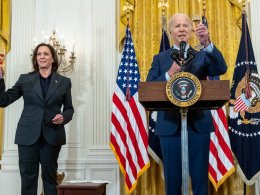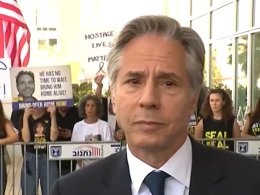In the latest broadcast of The Foreign Desk with Editor-in-Chief Lisa Daftari, Jason Brodsky, the policy director at United Against Nuclear Iran (UANI), and Behnam Taleblu, a senior fellow at the Foundation for the Defense of Democracies (FDD), discussed the ongoing developments over the Biden administration's push to revive the 2015 nuclear agreement with the Islamic Republic of Iran in light of the recent announcement that the administration is conducting yet another round of talks in Vienna, Austria with Tehran officials.
"The Iranians keep dangling hope, optimism, meetings, and innovative ideas as a lure to get American and E.U. diplomats to continue this process as part of their whole gambit," stated Brodsky.
According to Brodsky, the entire situation is unfortunate because of the reactive state, letting the Iranian regime drive the process, dictating the time, manner, scheduling, and the fact that United States’ diplomats are not present in the negotiating room.
Upon observing the scenes in Vienna, Brodsky explained how the Russian, Iranian, and Chinese delegations met to discuss the nuclear agreement and sanctions relief without any American officials in the room.
According to Behnam Taleblu, the thinking behind the administration's continuous efforts to revive the nuclear agreement stems from the philosophy of the Biden administration and the hyper-partisan nature of the Iranian debate in Washington.
The Iran issue, according to Taleblu, cuts right through the "dynamics between internationalists and isolationists."
"One the one hand, there are people who simply want to resurrect this agreement because it's become Democratic party-political dogma; it's the legacy of the Obama administration and sanction skeptics, making this a political trophy to put back on the shelf," said Taleblu.
Taleblu then explained that the nuclear deal is not being sold as a counterproliferation measure and is being sold as an "oil deal" to Washington to lower the current price of gasoline, tying into the political vector and desire by many for this deal.
Taleblu, like many other experts, noted that the administration does not believe that pressure works, given that numerous Biden officials have stated that sanctions against Tehran do not work.
"These officials think that pressure does not impede the program and instead is a driver of the program, pulling punches on the harsh economic penalties they inherited from the Trump, Obama, and Bush administrations and congressional lawmakers in the last few decades," said Taleblu.
On the issue of Iran's nuclear enrichment, sponsor of terrorism, repression against Iranian civilians, and Robert Malley's statement on Tehran's close to producing a nuclear warhead, Brodsky explained that these redlines "would be considered military by many several years ago."
"I believe President Biden made a critical mistake in the 2020 campaign, pledging to rejoin the nuclear deal and not invest a great deal of time, given the ongoing Russian invasion of Ukraine, economic issues, and a lot of other problems," Brodsky said.
Brodsky called for an Iranian reset, putting the political network in Washington to create an acceptable strategy with bipartisan support and become durable for all lawmakers.
"The U.S. should be actively and aggressively pushing back not just on the nuclear file but on non-nuclear issues like Iranian-backed terrorism and support for Iranian protest movements."
Adding on to Brodsky's statements, Taleblu stated that officials and lawmakers forget the history of Iran's gradually increasing escalation and reminded viewers that the regime has been paying attention to how the West acts and the actions of its leaders.
"The regime wants to take advantage of the risk aversion, the distractedness, and lack of desire of the Biden administration to invest political capital, time, labor, and resources, and invest into a solution to the Iran problem. They are looking to Washington to manage the Iran problem poorly and are happy that there is recrystallization of Iran as a nuclear threat rather than a nuclear threat," said Taleblu.
The issue of Iran's growing role as a sponsor of military arms to Russia in its invasion of Ukraine, Iran's meddling in U.S. domestic affairs, and human rights violations were outlined by Taleblu, arguing that it demonstrates a test for American foreign policy.
Towards the end of the interview, both experts agreed that ongoing Iranian protest movements throughout Tehran and other parts of the country are signs that the Iranian people want to see this regime end and are looking to the West for help. Taleblu called the Iranian protest movements the "most proximate threat the regime faces every day," lamenting Washington's decision to ignore their cries.
When presented with the hypothetical that the Biden administration does not revive the 2015 nuclear agreement with Iran, Brodsky explained that the administration would "have support in Washington from across the aisle with the best-case scenario for the U.S. being an Iran reset that includes durable and comprehensive actions." The worst-case scenario, according to Brodsky, is negotiations continuing for as long as possible, with the West wasting time and effort.
According to Taleblu, the President has a Plan C, allowing talks to "continue but not declare them dead." Tableau believes that the administration believes that keeping the discussion on life support provides a dampener to Iranian escalation, providing Tehran officials with little room to go up even as they have gained numerous concessions from the talks.
"The silver line from this initiative is the snapback sanctions from the U.S. and its allies, which put Russia and China on permanent arms and a nuclear ban against Iran," said Taleblu.
Are we appeasing Iran all the way to a bomb?










